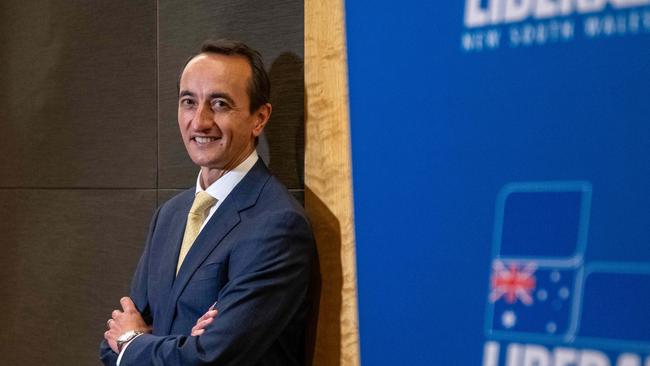Dave Sharma slams anti-Semitism in maiden Senate speech
Liberal Senator Dave Sharma attacks Labor for fuelling rise of anti-Semitism, warns of Argentina-like economic collapse and promises a better deal for young voters in his first Senate speech.

Liberal senator Dave Sharma has warned Australia has “crossed the Rubicon” and faces civil turmoil and national disunity because of weak leadership which has exposed Jewish Australians to discrimination, vilification, harassment and intimidation.
In his first speech to the Senate on Wednesday night, the former diplomat and Australian ambassador to Israel attacked the Albanese government’s economic plan and outlined housing and tax reform priorities to help the country avoid “becoming this century’s Argentina”.
The NSW Liberal Senator, who replaced former foreign minister Marise Payne in the upper house, said Australia’s biggest challenge is “complacency” and assuming the island nation’s prosperity is assured and security safeguarded by powerful allies.
The 48-year-old said young Australians were bearing the brunt of the home ownership crisis, which he described as a “breach of our social compact, an “anaemic” economy propped-up by migration and failure to address bracket creep.
After net overseas migration reached above 500,000 last year, Senator Sharma said “until we are able to accelerate our pace of home building, we need to reduce our immigration intake”.
Almost five-years after delivering his maiden speech as Wentworth MP in the House of Representatives, Senator Sharma said multicultural Australia had historically escaped “the sort of communal violence and sectarian tensions that often bedevil countries abroad”.
Amid a rise in anti-Semitism following the October 7 Hamas terror attacks and Israel’s military action in Gaza, Senator Sharma said “too frequently of late, our leaders have muted their voices, and our institutions have neglected their duties, in maintaining this compact”.
“Discrimination, vilification, harassment and intimidation against the Jewish community in Australia has reached unprecedented levels. I understand that people in Australia feel strongly, and differ in their views widely, about the rights and wrongs of the current conflict in the Middle East, and the terrible human suffering and tragedy that has accompanied it,” Senator Sharma said.
“But differing views is one thing … what we have seen in recent months has clearly crossed the Rubicon, and resulted in one community — and one community alone, the Australian Jewish community — being made to feel unwelcome in their own country, fearful in their own neighbourhoods, and anxious about the future they face here. This is utterly unacceptable. It is also incredibly dangerous.
“Jewish Australians are no more responsible for Israel’s conduct of this war than Palestinian
Australians are responsible for Hamas’s terrorist attack that prompted it. And, just as all other Australians, they are entitled to exercise their political freedoms and voice their opinions.”
Senator Sharma – who served as Australia’s ambassador to Israel between 2013 to 2017 – said “we simply must not tolerate the mix of mob rule, lawlessness, anarchy, intimidation and menacing behaviour that has been allowed to flourish in Australia these past several months”.
“It is doing irreparable harm to a community … but it is also doing irreparable harm to the social fabric of Australia. Today it might be Jewish Australians, but tomorrow it will be another group or another minority against which the forces of the populist mob are unleashed,” he said.
“Down that road lies civil turmoil and national disunity. Staying quiet, sitting on the sidelines, and hoping it will all go away, is a complete failure of leadership.”
Describing himself as a “patriot” in a speech encompassing geopolitics and Australia’s place in the world, the economy and social cohesion, Senator Sharma said the international order would be up-ended if Russia and Hamas were allowed to achieve their objectives.
Acknowledging the Ukraine and Israel-Gaza conflicts were “exacting a heavy human toll”, Senator Sharma lamented the “loud voices, growing louder, insisting that the costs have grown too high, and demanding that a settlement should be found — on any terms”.
“The test we face today, with these two conflicts, is whether we are prepared to uphold the important principles at stake. It was Henry Kissinger, reflecting on the breakdown in peace in the interwar period, who counselled that peace was the by-product of an international system that was willing to use force if necessary to maintain its underlying principles.”
“But, he warned, if these underlying principles were not enforced, then the system would quickly fall victim to the most cynical and ruthless states. If we truly want an enduring peace, then we need to defend the principles that deter aggressors, and Australia has to play its part in this defence. If Russia succeeds in extinguishing Ukrainian sovereignty, or Hamas is able to claim a meaningful victory, then we will have failed this test.
“Australia must do more to help Ukraine resist Russia’s aggression. And Australia must insist that a durable peace in the Middle East is only possible with the removal of Hamas.”
Amid flatlining economic growth and productivity, Senator Sharma said Australia’s economy was “anaemic … without migration, our economy would not be growing at all”. He cautioned that left unchecked, Australia was headed for a high-tax future and hard choices about where to direct “our shrinking national resources”.
“We are already seeing signs of Argentina syndrome in Australia, where much of the national debate is focused on how to divide the spoils, how to reallocate the burdens, and how to insulate key industries and sectors from competition.”
“Rather than how to grow the economy, so we are all better off. The heart of our national economic challenge is three-fold: to improve our demography, to boost our productivity, and to rein in government spending. To support a larger elderly population in a sustainable way, we need a larger working-age population.”
Senator Sharma said “we are failing a whole generation of younger Australians by denying them the ability to buy their own home … the failure here is overwhelming one of supply”.
“We must enable the building of more homes, more quickly, and more cheaply, or we will fail Australia. The shortage of housing is being exacerbated by high immigration, which is fuelling demand for already limited supply.”
Declaring that competitive pressures drive innovation and productivity, he says the Australian economy in key sectors, including banks, utilities, telcos, supermarkets, aviation and insurance, have “too little competition”.
“Corporate gross operating profits have surged over the past three years, whilst the share of national income going to labour has shrunk – despite low unemployment – to its lowest level ever.
“What we have witnessed is a rapid redistribution of national income. Big business has won. Workers and small businesses have lost. Australia now has one of the most concentrated economies in the developed world.”
Senator Sharma said Australia “faces challenges, the likes of which we have not encountered for many decades” and its three historic assets – remoteness, strong western allies and the rules-based system – were under threat.
“Longer-range weapons systems, plus the ability to interfere from afar through cyber and digital tools, means our geographic isolation no longer provides the measure of protection it once did.
“The US navy no longer enjoys uncontested predominance on the high seas. The People’s Liberation Army navy now has more battle force ships than the US navy, and is building new ships and combatant vessels at a higher rate.
“And the liberal international order is under strain, with a distinct shift towards a power-based, rather than a rules-based, order. If Australia is to remain a sovereign and independent nation, enjoying freedom of action and taking decisions in our own national interest, then we must confront each of these challenges.”
He said the erosion in geographic advantage meant the country must be better equipped to “deter and defend against potential attacks on our sovereignty”.
“This means greater surveillance and force projection capabilities in our defence forces, and an ability to operate further from Australia’s shores. We also need to strengthen our defences against espionage, foreign influence operations, and digital and cyber attacks.
“The Royal Australian Navy is now operating the oldest surface fleet in our nation’s history, and the timeline for an upgrade in our capabilities is too slow. Australia must embrace new technologies and doctrines — from longer-range missiles to armed drones and uncrewed platforms — that can quickly boost our power projection capabilities.”








To join the conversation, please log in. Don't have an account? Register
Join the conversation, you are commenting as Logout